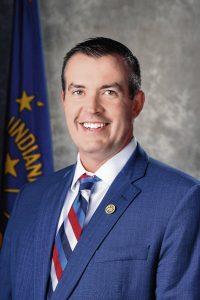The Indiana General Assembly has passed dozens of bills in its 2024 session, including bills authored by Johnson County lawmakers.
What started with roughly 1,750 bills was whittled down to fewer than 200 when lawmakers adjourned for the year Friday.
Some local lawmakers saw success with their bills and they were sent to Gov. Eric Holcomb for his signature to be signed into law. Holcomb has seven days to sign bills once they are sent to him. He could also veto them or let them go into law without a signature.
Here’s a look at how some legislation authored by local lawmakers fared.
PASSED: School safety

House Enrolled Act 1104 will change Indiana law to allow school police officers the option to be on a 1977 pension plan, which gives death and disability benefits. It would also allow school corporations or charter schools that have eligible employees, whether that be school resource officers, or personnel from an outside agency, to be eligible for the fund.
It also would make armed intruder drills at schools safer and more efficient. Her bill proposes that if a drill includes sensory components, schools would be prohibited from requiring student participation or holding it during regular school hours.
The bill is authored by State Rep. Michelle Davis, R-Whiteland. She crafted the bill after conversations with the Clark-Pleasant and Center Grove Police Departments, both of which are tasked with protecting their respective school districts, and Sandy Hook Promise, a nonprofit formed after the 2012 school shooting that works in gun violence prevention programs and policy making.
HEA 1104 passed the House of Representatives in a 96-0 vote, with three members excused and one not voting, on Jan. 30. The Senate passed an amended version of the bill 47-2 on Feb. 29, and the House concurred with the changes 93-0 on March 5.
It now awaits Gov. Eric Holcomb’s signature and will go into effect July 1 once signed.
FAILED: Medicaid behavior analysis services report

House Bill 1156 would have required the Office of the Secretary of Family and Social Services to prepare and submit a report to certain entities on the effects of Medicaid reimbursement changes to the applied behavior analysis services. This report would include: a summary of the changes made; the number of claims for Medicaid recipients of the services per month and throughout a Jan. 1, 2023, to Oct. 1, 2024, reporting period; the number of providers approved under Medicaid to provide the services; and more.
Last year, the Family and Social Services Administration, or FSSA, proposed increasing the state’s Medicaid reimbursement rates for Applied Behavioral Analysis therapy to establish a uniform rate. The new rates went into effect in January.
This bill was authored by Rep. Robb Greene, R-Shelbyville, who has been vocal about his concerns with the state’s changes. He had said they didn’t go far enough.
Greene hoped the report would show that he was wrong about the effects the changes would have on providers and patients. He hopes it shows that no one has lost access and that the number of providers accepting Medicaid patients remains the same, he told the Daily Journal earlier this year.
While the bill passed out of the House in a 97-0 vote on Jan. 29, it did not ultimately get a vote in the Senate Health and Provider Services Committee — ending the bill’s chances for 2024.
PASSED: Residential real estate service agreements

HEA 1222 will crack down on a robocall scam where homeowners receive a small cash offer in exchange for signing a decades-long contract that could cost them thousands, according to author Rep. Craig Haggard, R-Mooresville.
More than 300 Hoosiers entered into these contracts known as Homeowner Benefit Agreements, according to the Indiana Office of the Attorney General’s Consumer Protection Division. Robocallers generally offer to give homeowners between $500-$700 in exchange for signing a long-term contract, which gives the company exclusive rights to sell the home, if and when the homeowner decides to, or provide maintenance. A homeowner could only break the contract if they pay a termination fee, which could be 3% of their home’s value as estimated by the company, according to Haggard’s office.
HBAs can be binding for up to 40 years, even if the property changes ownership, and the company can place a lien on the property’s title, which complicates a homeowner’s ability to refinance, access home equity and transfer ownership. The contract is often binding to the property, so it remains in place even after the owner’s death, according to Haggard’s office.
HEA 1222 makes real estate service agreements unenforceable if it’s a contract for maintenance, purchase or sale of the property that is not expected to be completed within a year or is binding on future owners and creates liens on the property. It also allows individuals adversely affected by these agreements to seek damages against the service provider. Exceptions would be made for home warranties covering systems such as plumbing, heating and cooling, and electrical wiring, according to Haggard’s office.
The House passed the bill 94-0 on Feb. 1 and passed the Senate 47-1 on Feb. 27. Holcomb signed the bill Monday.
PASSED: Disaster relief fund

Senate Enrolled Act 190 will improve the accessibility of the state’s Disaster Relief Fund, also upping the maximum amount of individual aid. It also enables governments to apply for funds proactively for the first time.
It was authored by Sen. Cyndi Carrasco, R-Indianapolis, and Sens. Kyle Walker, R-Lawrence, and Linda Rogers, R-Granger, have been added as additional authors. Carrasco told the Daily Journal in January the bill was written in response to tornadoes that affected Johnson County last year and conversations with state officials about how to make the relief system more efficient.
The bill passed out of the Senate 48-0, with two members excused, on Feb. 6. The House voted 97-0 in favor of the bill March 4.
SEA 190 now awaits Holcomb’s signature, going into effect July 1 once signed.
PASSED: Crimes and election workers

SEA 170 will define “election worker” and make it a Level 6 felony to take certain actions for the purpose of influencing an election worker, obstructing or interfering with them, or injuring them.
Previously, it would have provided an exception to the requirement that certain electronic voting systems include a voter-verifiable paper audit trail, or VVPAT, if the voting system is being used to cast an absentee ballot with the absentee voter board. This was taken out of the bill as it made its way through the legislature though.
The legislation was authored by Sen. Greg Walker, R-Columbus, and Sen. Susan Glick, R-LaGrange, has been added as an additional author.
SEA 170 passed out of the Senate in a 45-3 vote on Feb. 5. An amended version passed the House in a 93-0 vote on Feb. 29, and Senate concurred with the amendments 35-13 on March 4.
It now awaits Holcomb’s signature, going into immediately once signed.
FAILED: Public safety

SB 240 would have made resisting law enforcement with a vehicle a Level 5 felony — increasing the maximum penalty from 2.5 years to six years. It also makes it illegal to partake in “spinning” — the repeated or continuous operation of a motor vehicle with the intent of causing the vehicle to perform a rotational skid. If someone is charged with a Class A misdemeanor for the crime, the bill also allows civil forfeiture of the vehicle, documents show.
The bill is authored by Sens. Aaron Freeman, R-Indianapolis, and Carrasco.
Increasing the penalties for resisting law enforcement comes after a series of dangerous and deadly incidents over the last year, and calls from Johnson County Prosecutor Lance Hamner for the penalty to be upgraded.
“Spinning” is an issue that has been reported numerous times in Indianapolis. Organized “spinning contests,” plus other acts of reckless driving, have led to serious injuries and property damage around the city, the Indianapolis Star reported.
SB 240 passed out of the Senate on Feb. 6 in a 45-3 vote. But the bill was never voted on when it was before the House Courts and Criminal Code Committee, killing the bill for this year.





